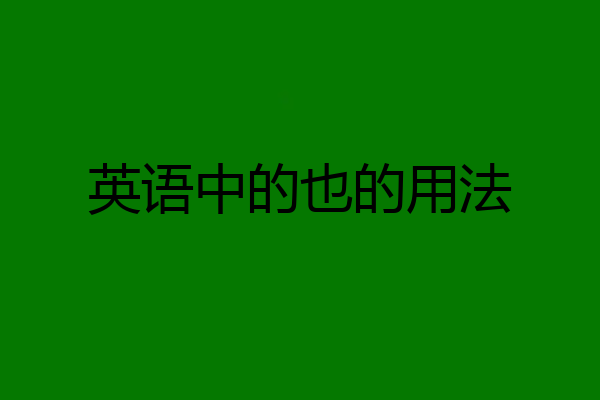
就在水的一方
英语中表示也的单词和词组有:too,also,either,as well as一. too, also, as well:都用于肯定句,表示前者怎样后者也怎样。too:一般放在句尾,可用逗号和前面的句子隔开,也可不用;also:其位置大多放在be动词、助动词、情态动词之后,实义动词之前;as well:其位置一般放在句尾,三者可以作同义句转换。例如:You need to go shopping and I need to go shopping, too.=You need to go shopping and I also need to go shopping.=You need to go shopping and I need to go shopping as well.二. either:用于否定句中,表示前者不……,后者也不……,其位置一般放在句尾。例如:He doesn”t want any coffee, and I don”t want any, either.You don”t know the way and I don”t know it, either.


已然晕菜
这三个词都表示“也”的意思。 also用在主语之后,too 和either用在名子末尾。 also和too都用在肯定句中,either用在否定名中。 例: I also have a pen. I have a pen too. I don't have a pen either. 希望帮到你!! 望采纳!!!!

jingmaotong
either表示“也”时一般只用于否定句,且只置于句末。例如:Idon'tknowhim.Tomdoesn'tknowhim,either.我不认识他,汤姆也不认识他。Ifyoudon'tgothere,hewon'tgothere,either.如果你不去那儿,他也不去那儿。aswell常用于口语,用法和too一样,通常位于句末,它前面通常不用逗号。例如:Sheisateacherandasingeraswell.她是教师,也是歌唱家。IknowJapaneseaswell.我也懂日语。aswell和either都有“也,而且”的意思,主要在这个意思上来区别。在这个意思上,either用于否定句或否定词组后面加强语气,例如:Ifyoudon'tleave,Iwon'teither.而aswell则与前者相反,用于肯定句句尾,与too的用法相同,例如:Heismyteacher,butheismyfatheraswell.他是我的老师,而且他也是我的父亲。

yaodabian0214
适用于:初三同学一. too, also, as well:都用于肯定句,表示前者怎样后者也怎样。1.too:一般放在句尾,可用逗号和前面的句子隔开,也可不用;also:其位置大多放在be动词、助动词、情态动词之后,实义动词之前;as well:其位置一般放在句尾,三者可以作同义句转换。例如:You need to go shopping and I need to go shopping, too.=You need to go shopping and I also need to go shopping.=You need to go shopping and I need to go shopping as well.2.too 是普通用词,多用于口语,语气较随便。一般用在肯定句中,放在句末。例如: I\'m in Row 1, too. 我也在第一排。 also 是比较正式的用语,语气较庄重。它经常放在句中,位于行为动词之前,连系动词之后;如有助动词或情态动词,一般放在助动词或情态动词之后。例如: Mrs Green can also sing the song in Chinese. 格林夫人也能用汉语唱这首歌。二. either:用于否定句中,表示前者不……,后者也不……,其位置一般放在句尾。例如: He doesn’t want any coffee and I don’t want any, either.You don’t know the way and I don’t know it, either.注意:either 本身没有否定的意义。 (错)He didn\'t come. His brother, either. (正)He didn\'t come. His brother didn\'t, either转自:北文学校